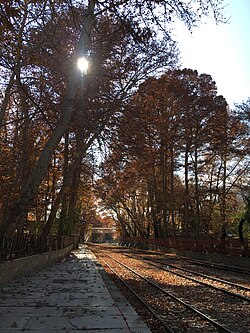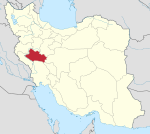Istgah-e Bisheh
Istgah-e Bisheh Persian: ايستگاه بيشه | |
|---|---|
Village | |
 Istgah-e Bisheh | |
| Coordinates: 33°19′55″N 48°52′40″E / 33.33194°N 48.87778°E[1] | |
| Country | Iran |
| Province | Lorestan |
| County | Khorramabad |
| District | Papi |
| Rural District | Sepiddasht |
| Population (2016)[2] | |
• Total | 359 |
| Time zone | UTC+3:30 (IRST) |
Istgah-e Bisheh (Persian: ايستگاه بيشه)[a] is a village in Sepiddasht Rural District of Papi District, Khorramabad County, Lorestan province, Iran. The Bisheh waterfall, one of the Lorestan's tourist attractions located in this village.[4]
Demographics
Population
At the time of the 2006 National Census, the village's population was 604 in 132 households.[5] The following census in 2011 counted 477 people in 130 households.[6] The 2016 census measured the population of the village as 359 people in 115 households. It was the most populous village in its rural district.[2]
See also
Notes
References
- ^ OpenStreetMap contributors (2 January 2025). "Istgah-e Bisheh, Khorramabad County" (Map). OpenStreetMap (in Persian). Retrieved 2 January 2025.
- ^ a b Census of the Islamic Republic of Iran, 1395 (2016): Lorestan Province. amar.org.ir (Report) (in Persian). The Statistical Center of Iran. Archived from the original (Excel) on 12 October 2020. Retrieved 19 December 2022.
- ^ Istgah-e Bisheh can be found at GEOnet Names Server, at this link, by opening the Advanced Search box, entering "-3056475" in the "Unique Feature Id" form, and clicking on "Search Database".
- ^ "Bisheh Waterfall: One of Major Attractions of Iran's Lorestan". Tasnim news (Creative Commons). Retrieved 27 October 2017.
- ^ Census of the Islamic Republic of Iran, 1385 (2006): Lorestan Province. amar.org.ir (Report) (in Persian). The Statistical Center of Iran. Archived from the original (Excel) on 20 September 2011. Retrieved 25 September 2022.
- ^ Census of the Islamic Republic of Iran, 1390 (2011): Lorestan Province. irandataportal.syr.edu (Report) (in Persian). The Statistical Center of Iran. Archived from the original (Excel) on 19 January 2023. Retrieved 19 December 2022 – via Iran Data Portal, Syracuse University.


